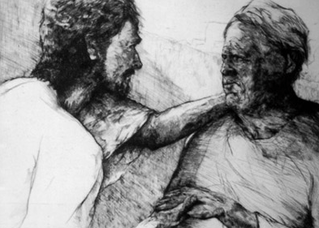 I am jumping ahead a bit in my thread on the Sermon on the Mount, but, there is something very narratively-interesting (yes, I made up a word here) about what story Matthew chooses to come right after, that is, to immediately follow the Sermon on the Mount. He could have picked from dozens of known Jesus-encounters or teachings, but this is the story he choose for us to hear right after the Kingdom-inviting-and-living-righteously-sermon that began at 5:1 and concludes at 7:29. Here is the text of Matthew's post-Sermon on the Mount thread. Afterward, then, please note with me a few narrative inferences that seem very applicable to the church that stands in front of the narrative. (That's us!)
First, note this is purposeful (i.e., a calculated choice by Matthew), for there is a connection to the “crowds” from the the beginning, whom Jesus was ministering to at the start of the Sermon (4:23-5:2). This is Matthew's way of connecting the Sermon to the encounter Jesus will have at the head of chapter 8. The reader is not to disconnect the Sermon on the Mount to this following event, thus leaving the reader to ask, what is the significance of the leper in this narrative to what we just heard from Jesus on that mountain? Second, Jesus had just made an invitation into his kingdom and explained what righteousness was, not only required in this kingdom, but was, also, to flow from living out the kingdom and his first encounter is a leper. This, of all people in the land, is certainly one of the target groups of the Beatitudes (poor in spirit, mournful, meek/powerless), a much marginalized social class, and very unclean. Third, note that Jesus touched the leper before he healed him—significant, because you don’t touch lepers and if you do, you share in their uncleanness (get it?). Then, finally note, the kingdom is realized when “immediately” the leper was made clean. You must remember that pure of heart in 5:8 is actually [socially, religiously] “clean of heart.” So there is a definite narrative pun (connection) here for the reader to catch. This narrative was no interruption, but was the sermon's application. Now go and do likewise.
0 Comments
 Living out, both as individuals and as a gathered-church, the Sermon of the Mount, should appear as a threat to the social and cultural status quo and to those invested in maintaining this status quo. As such, Sermon on the Mount living cannot help but challenge the way things are. Interestingly, in the Sermon on the Mount there is no mention of ranting on public platforms as the means to challenge the powers, no mention of protesting or boycotting, no calls for platforms to leverage any form of power, no voice nor stones–only light and salt (i.e., living in community, that is as church); rather we are not to practice our righteousness hypocritically for the applause and/or affirmation of others (and you don't get invited to be an A-list Christian speaker without that applause), not to judge, and are to do to others how you want to be treated (no matter how you are treated by them). Living out the Sermon on the Mount is meant for church, a social group whose allegiance is to the risen Lord Jesus, not to be attempted solo, for apart from the gospel at work in the flock of God, encouraging one another and loving one another, such living is impossible. The Sermon on the Mount is not possible for the State to legislate by law apart from granting power to some to enforce by forms of punishment and violence. Surprisingly we seem to be doing the opposite. We love the opposite, because we like power, whether the power of the crowd (i.e., the mob) or the power of platformed applause. Sermon on the Mount living is the opposite of power. And, we are impatient. Sermon on the Mount living demands patience. And, we trust our leverage and platforms. Sermon on the Mount living calls for extraordinary, faithful trust in God's ability to work in the affairs of humankind, and thus to be often hidden and away from the applause of others. It is no wonder that the first two book volumes produced by the church were on "Patience" (i.e., Tertullian and Cyprian). No one, especially Jesus, said this Sermon on the Mount living is easy. This is why the gate is narrow to this life, the life imagined by the Beatitudes. We, as church and, especially, our individual elite-celebrity Christians, seek to use the wide and broad way (judging, law and thus State enforced punishment and retaliation, encouraging hatred and others to judge, and non-forgiveness, and the building of power and leverage (the complete opposite of the Sermon on the Mount), which leads to destruction. And just in case we didn't get that the Sermon on the Mount is actually God's word to his church, we are to build on the Rock of this Word and not the sands shifting power. God, forgive me for not living out the Sermon on the Mount and for being all too willing to call the church and other Christians to live out the wide and broad way to get our way in this world. *Check out as a part of this thread, Matthew 6:1-18 as a reflection on the Beatitudes >> Click Here
In this, they mistakenly imagine that to pass a referendum, elect a candidate, pass a law, or change a policy is to change culture. In truth, they probably know better, but in terms of the amount of energy expended and money spent, the net effect is a view much like this. While Christian activists (conservative and progressive) have been fairly influential in the political sphere at different times in recent decades, they have embraced a means to power that seethes with resentment, anger, and bitterness for the injury they believe they have suffered. The public and political culture of contemporary Christianity have become defined by such negations. Christians believe that they have a legitimate right to participate in the democratic process and they are, of course, right. The problem resides with the political culture they not only embrace but have helped to create. The tragic irony is that in the name of resisting the dark nihilisms of the modern age, Christians—in their will to power and the ressentiment that fuels it—perpetuate that nihilism. In so doing, Christians undermine the message of the very gospel they cherish and desire to advance" (James Davison Hunter from To Change the World). *My previous post on Voting and the Table
The salt, light, and city imagery should be read in light of or as flowing from the Beatitudes (Matthew 5:3-12). Verses 11–12 are certainly a bridge, making a pivot from the general invitation nature of the Beatitudes to the church directed “you are” subjects in vv. 12-16. Yet, what penetrating flavor? What light is to shine? What kind of City on a Hill? The reference to doing “good works” in verse 16, at a minimum, implies the good and counter-cultural and contra-social/societal flourishing that flow from the Beatitudes. Salt and light that indicate that the poor in spirit (by now should should know this means the actual poor), those who mourn (i.e., those lacking resources), and the meek (i.e., the powerless of the earth) have the kingdom, are comforted, and inherit the earth; light that illumines from a City where the desire for God’s justice is thirsted for and hungered for; where mercy prevails, the unclean are welcomed, and filled with peacemaking sons of God. The content and polity (if you will) of the City on a Hill (which I do take as church, bytheway) is the Beatitudes. And, if you (we, that is a church) actually lives under this constitution of Beatitudes, remember, “Blessed are those who are persecuted” for persecution will come for these social-upheaving Beatitudes are not naturally welcomed nor accepted by the powers (i.e., the powerful and those in power); and, remember, you are blessed “when others revile you and persecute you and utter all kinds of evil against you falsely” for power (the powerful and those in power) do not want a City like this. But “rejoice and be glad, for your reward is great in heaven, for so they persecuted the prophets [i.e., those who foresaw this City on a Hill, the king of this City, and this time of Beatitude-flourishing] who were before you.” Jesus is the King of this City and it is the good works of the Beatitudes that will glorify our Father who is in heaven.
 So many values and virtues, which came from the appearance and presence of Christianity in the world 2,000 plus years ago, in our culture, exist today as noble and ideals amongst society, so much so that the intent of Jesus’ Blesseds are now tempered, eased, toned down, dulled, softened. Their bite taken out. Their edge taken off—so that their radical, self-righteous slaying, Christendom destroying, idol bashing, social leveling, culture reversing power is missed and dismissed by much of the church and ignored as simplistic and assumed platitudes by modern crowds. The gospel is actually missed.
We exist at a time when the Cheshire cat smile of these Beatitudes exist (in vague social and cultural forms and weak values and virtues, and, even, as political correctness); but the cat (i.e., the intent Jesus had in the first place) is all gone. These verses, Matthew 5:3-12 (above), were the most oft quoted, referred to, and referenced New Testament texts in the first 150 years of the church. They were the call (invitation) to the faith, the test of faithfulness, and the bane and annoyance of existing powers. You want to know how Christianity spread so rapidly and the church increased beyond imagination in the first 150 years--they actually believed the Beatitudes. And, did them. The early believers, mostly poor and lacking resources, small and powerless and often hidden, lived the life the Beatitudes described, endured attacks against the message they implied, and, as a result, out-lived an empire. Our problem now, is we like the smile but care not the cat has disappeared. We've turned much of the Beatitudes 180° degrees from their original intent that they no longer slay us nor confront the culture (or the church) with all its social hierarchy and status, its vertical world. The Beatitudes are interpreted and used in ways so that the rich, famous, elite, the educated, the privileged and advantaged are comforted to think that they are, as well, “poor in spirit," so they get to keep their privilege and advantage (as long as they recognize their "spiritual poverty"). The privileged get to continue in the culture and social structures that gave them their advantage. Heck, theirs is the kingdom! Now and in the future. Who wouldn't want that deal? The Beatitudes are not a platform for your privilege, fame, celebrity, or power . . . they are to disturb everything that made you, that enabled you to have social status, to destroy every advantage you have had to enjoy the privileges you have . . . the Beatitudes level, they turn (for those who believe the kingdom of heaven has come) the verticalization of this social and cultural world (with all its advantages) and horizontalizes everything. If the Beatitudes don't do this to you, then you are seeing just the Cheshire cat smile. The cat is gone. 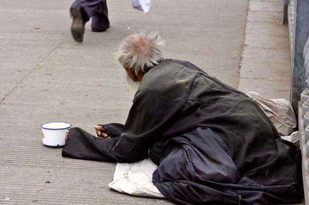 How do the rich, affluent, powerful, and wealthy break and destroy the idols that blind them and make them deaf? They accept the invitation to a kingdom, the kingdom of heaven, where the poor in spirit (the actual poor among them, the outcasts, marginal, uneducated, the sick, infirmed, and afflicted, and mentally unstable; cf. Matthew 4:24-5:1); where those who mourn for lack of recourses; and, where the meek, that is the powerless, have the kingdom, will be comforted, and shall inherit the earth. This is the kingdom to which the affluent, wealthy, and the advantaged, that is the powerful and resource-rich are invited. Of course, these lines in the list of Beatitudes are for all who seek first God’s kingdom and his righteousness. I am here focused on the powerful and resource-rich who hear this gracious invitation to the kingdom of Heaven. This is the kingdom to which the powerful and resource-rich are invited, a kingdom where they thirst and hunger for justice [yes, that’s exactly how I believe Jesus meant it]; where they will extend mercy because it is the merciful that will receive mercy; where the clean in heart make room for the unclean, because they see God; where they will be peace-makers, because they will be called Sons of God. This is an impossible invitation: for those who have been made blind and deaf and immovable because of their idols, these need the gospel, the power of God unto salvation. This is why Jesus died on that cross. This is the way in which God changed the world—really, the way in which he brought into existence, the reality of his recreated world, his kingdom of heaven. Yet, still, these words of the Beatitude are an invitation, waiting for you, through the gospel of Jesus Christ, to accept. In the end, both at our death and at the end of time, this is the kingdom that matters, the only kingdom that will remain. It is the kingdom of heaven to whom God, the Most High, will give to his saints (Daniel 7:18). This is why it makes sense that “the poor in spirit” are blessed, “because theirs is this kingdom.”
 Some more thoughts on: “Blessed are the poor in spirit, for theirs is the kingdom of heaven” (Matthew 5:3). Who are “the poor in spirit”? There is absolutely no doubt that they are, well, the poor. The context (Matthew 4:23-5:1) and the words “poor in spirit” are in the company of other objects of the “Blesseds” (i.e., the 3rd person beatitude subjects) that suggest those who are among the marginal. The phrase, “the poor in spirit,” is often turned into “everyone,” since everyone is poor in spirit, that is, we are all poor before God–you know, everyone is in spiritual poverty. Well, that simply can’t work in this text. First, it doesn’t say that. Second, that would mean Jesus meant, “Blessed is everyone since everyone is spiritually poor, for theirs (aka everyone) is the kingdom of heaven.” Nothing radical about that. Or, what's the point? And by the way, you just can’t make the text say “Blessed is everyone who recognizes they are spiritually poor . . .” either. The text simply gives no hint or translative potential for that spin. You can read into it; read back into it. But that's not what Jesus said and no exegetical fancy-foot-work (to protect and include the non-poor) can turn what Jesus said into “everyone” or “everyone who recognizes . . .” Sorry. Ain't in there to be had this way. Simply: I believe many good intentioned Christians are afraid of what it means if indeed Jesus actually said, “Blessed are the poor [the actual poor] in spirit, for theirs is the kingdom of heaven.” Yet, he did. Deal with it. Don't rob the poor of this mind blowing, culture changing, kingdom reversing, Christendom destroying, idol bashing text. And don't rob the non-poor, the rich, of the blessing that comes with realizing what kingdom God has brought about in the appearance of Jesus Christ.
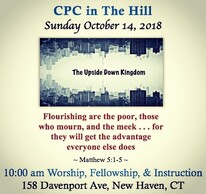 Working on the sermon for this coming Sunday morning when I noticed a dynamic parallel between the first line of the Beatitudes and Isaiah 61:1: “Blessed are the poor in spirit, for theirs is the kingdom of heaven” (Matthew 5:3). “to bring good news to the poor; he has sent me to bind up the brokenhearted” (Isaiah 61:1b) Many have noted that the Sermon on the Mount as a whole is fulfillment of or stems from the Isianic promises and in particular Isaiah 61. Matthew's Sermon on the Mount is his version of Luke's use of Isaiah 61 in Luke 4:16-19. You can see the connection between "poor in spirit" and Isaiah's parallelism of "to the poor" and "to bind up the brokenhearted."
If we turn the “poor in Spirit,” “those who mourn,” and “those who are meek” into “everyone who recognizes they are poor in spirit” and “we all mourn” and “we are all meek before God,” we rob the poor, the mourning, and the meek from the empowering words Jesus spoke. We rob the rich and powerful of the repentance and new vision of the kingdom that Jesus calls them to. We literally have taken the poor out of the “poor” and the mourning away from “those who mourn” and have turned everyone into being meek. We need to hear these beatitudes as if we are a part of that crowd (Matthew 4:23-5:3ff).
“Blessed are the poor in spirit, for theirs is the kingdom of heaven” (Matthew 5:3). 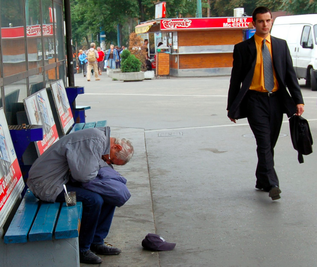 The way some Christians talk and make comments about this verse . . . you’d think that Jesus said, “Blessed are the ones who recognize their spiritual poverty and got themselves together, for theirs is the kingdom of heaven . . . “ NOT (at all)! When we teach that Jesus meant that “we are all spiritually poor” we rob both the rich (the opposite of poor) and the poor (the opposite of wealthy) of God's word to them––no one ends up “Blessed.” 1) For the one, the poor, this is a text of hope and of life, that God's got their back and that the world (this present world) isn't all it seems to be; 2) for the other, the rich, this text is an awakener (more a judgment), that they are on the wrong side of God's history. The rich are robbed of faithful discipleship when they think (and we teach them so), this text is about them. The rich-turned-follower of Jesus ought to read this text (and the remainder of the Sermon on the Mount) and ask, “How do I bring my life into alignment with the world Jesus envisions?” Not, “Phew, I get my spiritual poverty fixed, plus I get to stay rich AND inherit the kingdom of heaven.” Who wouldn't want a deal like that! Spoiler alert: the rich were the only ones to inherit anything anyway, so in some way they already had the “inheritance.” In fact, in the Greco-Roman world, the elite and wealthy were the only ones to get the world to come. Inheritance was the language of the rich, not the poor, which would have indicated how subversive Jesus' vision of the world would have been. The crowd Jesus preached his Sermon on the Mount to seems mostly made up of the crowd he was just previously ministering to in chapter 4: And he went throughout all Galilee, teaching in their synagogues and proclaiming the gospel of the kingdom and healing every disease and every affliction among the people. So his fame spread throughout all Syria, and they brought him all the sick, those afflicted with various diseases and pains, those oppressed by demons, those having seizures, and paralytics, and he healed them. And great crowds followed him from Galilee and the Decapolis, and from Jerusalem and Judea, and from beyond the Jordan . . . Seeing the crowds, he went up on the mountain, and when he sat down, his disciples came to him. And he opened his mouth and taught them, saying: “Blessed are the poor in spirit, for theirs is the kingdom of heaven . . . (Matthew 4:23-5:3). There is no doubt that both in the historical occasion (i.e., the scenes depicted in the text above) and for the "crowd” listening to Jesus' sermon, they understood to whom he was referring when he mentions "the poor.” Most likely "poor in spirit" reflects the Isaiah 61:1 that was promised and Jesus quoted to refer to Himself: "to bring good news to the poor; he has sent me to bind up the brokenhearted."
So, to hear and apply this beatitude (as well as the rest), we need to stop taking the poor out of the poor and making it everyone (because, you know, everyone is spiritually poor before God–just stop it!). This only cheapens what Jesus said–and no one gets blessed.
|
AuthorChip M. Anderson, advocate for biblical social action; pastor of an urban church plant in the Hill neighborhood of New Haven, CT; husband, father, author, former Greek & NT professor; and, 19 years involved with social action. Archives
February 2024
Categories
All
|
Pages |
More Pages |
|

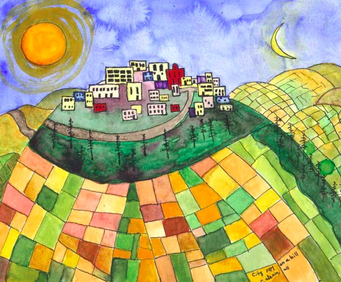


 RSS Feed
RSS Feed